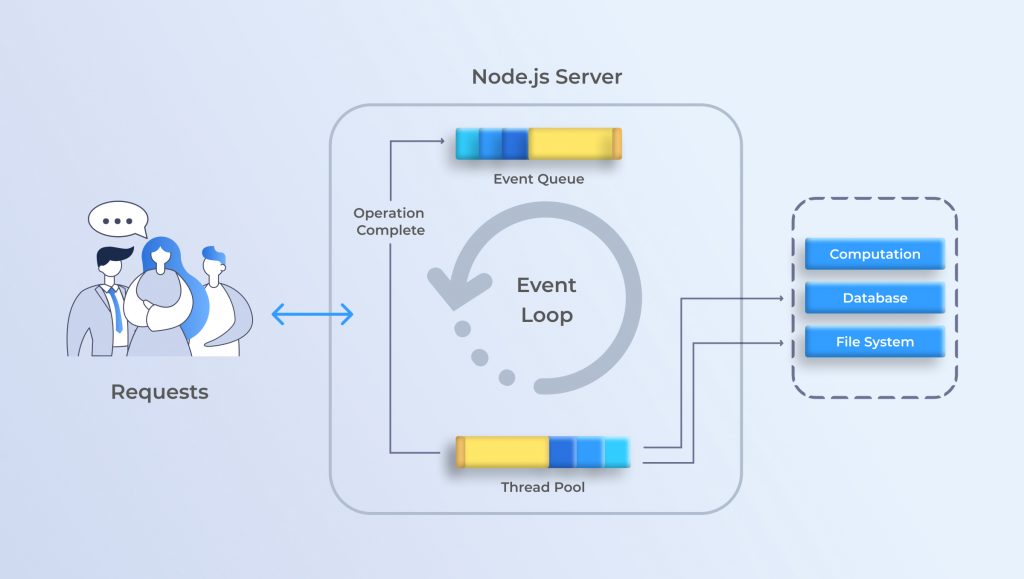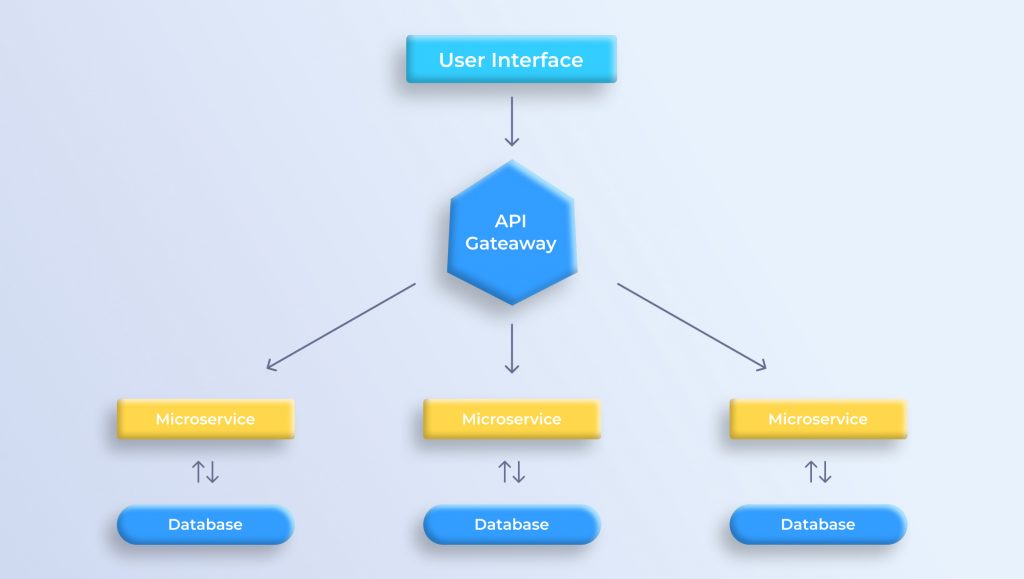Table of Contents
In the world of enterprises, strong and quick software became a must-have, whether you’re looking for services to use inside the company or you’re offering a product to your audience. Usually, enterprise applications and websites need to handle a lot of users with minimum delay in response and show high performance. Another parameter is time and budget of development: if it’s possible to optimize them both, that’s definitely a win.
So what technology to choose? We believe that Node.js is the most appropriate one for enterprise software. At this point, you may ask: “But why to use Node.js for enterprise purposes if we still have good-old PHP and Java?” We will guide you through the ecosystem of this technology, explaining what Node.js is good for and how it works.
What is Node.js?
Node.js is an open-source runtime environment for executing JavaScript code. It’s used to build back-end services as APIs to power web and mobile apps.
Earlier JavaScript has been mostly used to work on web pages along with HTML and CSS. But unlike them, JavaScript is actually a programming language that runs on the browser.
To make applications work, the browser needs to convert JS code to machine code, and it is possible with a JavaScript engine. The most popular one is V8, which does it directly. So if JS was getting faster, why not try it for other stuff, for example, server-side development? To achieve that, Node.js was built as an environment, which is based on the V8 engine and can work outside the browser.
Advantages of Node.js
Developers all over the world choose to use Node.js for enterprise purposes because it is very suitable for real-time applications like social media, online gaming, or instant messaging. There is a high demand for this type of apps, and Node.js offers them the following advantages:
- Efficient development: with Node.js, your team can use one language across the entire project. Client-side and back-side developers are able to understand code written by each side without a lot of time needed for explaining any disconnects. Prepared node.js code can also be reused for the general operation from project to project.
- Speed: we already mentioned the V8 engine that powers the code, which allows Node.js code to execute so quickly. Node.js usage only expands over time, and Google keeps investing in support and updates for V8.
- Cross-platform development: it’s possible to develop a cross-platform desktop app along with your web app. With the help of other platforms, you can use some part of the Node.js code for desktop applications without deep expertise in app programming languages.
- Community: Node.js is an open-source technology, meaning that there are a lot of enthusiasts who constantly share new libraries and support the evolution of the language.
Features of Node.js
Asynchronous and Event-Driven
The nature of Node.js is asynchronous with a non-blocking input/output model. It means that while working with one request, Node won’t block the handling of others. It differs dramatically from the opposite synchronous nature of the application.
Synchronous apps usually have multiple threads: each of them is allocated to a new request. So, it works like this: one thread receives a request and queries it from a database. While database processing, the thread is waiting for the result, and sometimes it takes some time. If there is another request simultaneously, another thread will proceed. But if your app has thousands of users? Either they will be forced to wait, or you need to increase the number of servers. Of course, you can switch to asynchronous nature, but it will take more effort.
Node’s single thread handles all the incoming requests. It transfers it to the database but doesn’t wait for the result and goes ahead and processes the next requests. When the result of the requests is prepared, the message is put into the event loop. When Node.js finds out that the request is ready, it uses a callback to deliver it back to the user.

This makes Node.js efficient for the development of data-intensive apps with a constant flow of requests. But when there is a heavy computation request, for example, video encoding or machine learning, the single thread will block all other requests and cause a delay.
Easy Caching
Caching helps to improve user experience by temporarily saving the content of web pages closer to the user and speeds the further download. Node.js has various services to improve caching, and that’s an additional point to the high speed of this technology.
Node Package Manager
One of the coolest Node.js benefits is npm, or Node Package Manager. Basically, it’s installed automatically with Node.js and used for downloading (or uploading) ready-made packages from the cloud server. With npm, a developer doesn’t need to reinvent the wheel: the most common tool your application may require were already developed by someone and publicly shared as modules, thanks to the open-source approach of Node.js.
Interested in Node.js development
We are will provide you with an estimation of the Node.js project and get down to work.
Node.js Usage Statistics
Node.js has been gaining popularity since 2009 when it was created by Ryan Dahl, an American software engineer. New developers start to use Node.js because there is no need to learn a new language if they are already familiar with JavaScript, so it easily opens the door to full-stack development in an enterprise. Node.js enterprise advantages also include flexibility, high speed of processing, and an active community of supporters.
- 43% of Node.js developers use it for building enterprise applications (2018 Node.js User Survey Report);
- At least 1.2% of websites from all Internet use Node.js (W3Tech);
- 56% of users claimed that Node.js reduced development cost (2018 Node.js User Survey Report);
- PayPal states that Node.js decreased its average response time by 35%;
Why do Enterprises Choose Node.js?
Node.js is one of the most common choices of enterprise-level companies and corporations. They even created the Node.js Foundation in 2015, counting large-name companies such as IBM, Intel, Microsoft, GoDaddy, and SAP as its members. So what’s so special about Node.js, what does it offer enterprises in development that makes it so unique?
Performance and Scalability
Enterprises are interested in big applications for multiple users. They usually have a long life cycle, therefore regular improvement is necessary to stay relevant and attractive. Scaling is baked into the concept of Node.js from the beginning, providing developers with the power of flexibility.
Another angle [why we chose Node] was performance, non-blocking, async was an attractive aspect for us. We went from 40 minutes of startup time to the minute, and it was a huge improvement.
One of the bottlenecks of Node development is memory and processing limits, but it can be solved with the help of the Node.js Cluster Module. The module allows splitting a single process (workers) into multiple, which will balance the workload over several CPU cores, and that’s how you can increase the availability of scaling and decrease the amount of hardware.
Most enterprise applications have a huge data exchange between the user and database, and every company is in the race for the best user experience. Non-blocking IO and other Node.js features contribute to that by giving the better capacity to handle huge amounts of traffic and speeding the uploading time.
Node.js Success Stories
Netflix
Netflix streams around 100 million hours per day with more than 60 million users, so scalability is one of the main goals for the developers. Previously, the team used Java for backend and JavaScript for frontend and this resulted in the monolithic application. Node.js gave an opportunity to switch to microservice architecture which is easier to scale and maintain. Kim Trott, Netflix director of UI platform engineering, shared that it was hard to change from Java mindset to Node.js, but eventually, it helped to fully focus on the product experience essential for the company.
Another perk of embracing Node.js is that frontend and backend developers became able to understand each other’s code. The communication improved, everyone could detect bugs on both sides of the app which increased the speed of development.
PayPal
PayPal also replaced Java with Node.js to turn their team into full-stack developers. We already mentioned that the company reached improvement in response time. But it also influenced the work speed: while trying JavaScript, PayPal developed the app with the same spec on Java to play it safe. Eventually, the JavaScript app was ready at the same time as Java one, but its development started with a delay of 2 months and a smaller team.
Node.js helped to create a cross-functional team that again could pay more attention to the user experience and needs.
This social network used Node.js to speed up their mobile app, previously built on Ruby on Rails. The engineering team was looking for an easy solution for larger-scale and efficient interaction between API and database, therefore Node.js came in handy.
As a result, LinkedIn was able to decrease the number of servers and hardware for service hosting, wherein traffic capacity was increased.
NASA
The biggest space agency on Earth uses Node.js, too! As you can imagine, NASA’s employees operate a huge amount of information every day. It’s also crucial to keep the historical data and have easy access to it at any moment, especially in case of emergencies.
So when in 2013 astronaut Luca Parmitano discovered that his helmet was leaking with water while he was spacewalking, NASA’s engineers needed to access all the info about the spacesuits astronauts were equipped with. And here they faced the problem: the data was scattered across several databases, and it was impossible to collect it quickly. To prevent this from happening again, the agency decided to focus on Node.js enterprise architecture and create a separate cloud database with easy access.
The main Node.js advantages that persuaded NASA’s developers to choose this technology were familiarity with JavaScript and the asynchronous nature that provides quick request handling.
eBay
eBay built its ecosystem using Node.js. This technology helps to improve the support of the platform, as a lot of updates are implemented every day. It gave them an opportunity to turn common elements like automation libraries or development tools into Node.js enterprise modules, which saves the time of development.
Want to update your software with Node.js?
We wil help when it's time to switch your application to it
Combining Node.js with a Microservices Pattern on Enterprise Level
As we already mentioned, Node.js is very efficient in I/O intensive work, meaning it can handle a lot of requests simultaneously, like adding or reading info from a database. It’s also lightweight, and that’s why it’s considered one of the best languages for the development of a microservice architecture. Microservices are independent, but they are connected via APIs. This is how it works:

Microservices may have different roles, for example, they may be used for:
- authorizations;
- notifications;
- payment systems etc.
Microservices are perfect when you need to scale your application: you need to add a new tool and build required connections, but you don’t need to change or update the services already developed.
Building Cross-Functional Teams
There are two approaches to assembling a team: functional and cross-functional. A functional team usually consists of the same specialists, for example, it can be a team of front-end developers or a team of testers. Therefore, a few different teams are working on the project. Another approach means that one team is working on the project, but its members are different specialists: front-end and back-end developers, testers, architects, designers, etc.
Node.js helps us solve this (the boundary between the browser and server) by enabling both the browser and server applications to be written in JavaScript. It unifies our engineering specialties into one team which allows us to understand and react to our users’ needs at any level in the technology stack.
A cross-functional team usually creates a product with a better user experience than a functional team. When people with different responsibilities work together, they get an alternative perspective on the project and become invested in the whole production cycle instead of their sole part.
As you can guess, it’s a good idea to use Node.js for building a cross-functional team. In this case, you’re working with JavaScript on both ends. The front-end developers can easily dive into the back-end side and vice versa. QA engineers who work with Angular or React can easily figure Node.js out. Moreover, the usage of Node.js encourages full-stack development when one person can be in charge of the whole tech part of the project.
How to hire Node.js Development Team
Choosing to work with a dedicated team for Node development for enterprise-level companies proved to be the most efficient approach for software creation. It saves your time, money, and effort: you get a synchronized group of people who have deep expertise in the required technology pool.
Cooperating with a dedicated team is much faster than hiring an in-house team from scratch: you don’t need to conduct job interviews and test every specialist with tasks, which may take months of precious time. But even if your staff includes tech specialists, a dedicated team may strengthen their effort and offer knowledge of new technologies.
When looking for a qualified Node.js dedicated team, pay attention to the following aspects:
- portfolio and previous cases demonstrating quality of development;
- testimonials and reviews from previous clients on Clutch, GoodFirms, or other directories;
- methodologies and approaches, which determine the flexibility and efficiency of the development.
Choose Altamira as Your Outsourced Node.js Partner
We are always ready to build Node.js enterprise software with you! With 10 years of experience, we gained wide expertise in web and mobile development and created an ecosystem that optimizes the development process.
Dedicated team
Our dedicated team offers you a full cycle of creating a product, including marketing research, business analytics, and testing. You don’t need to spend copious time on management or determining tech specifications, as we provide you with all the required info during the Discovery Stage. We guarantee high quality, executing projects in-house from start to finish, and never delegate or outsource projects to third-parties.
Expertise
Our team consists of experienced frontend and backend developers, quality assurance engineers, tech leads, and project managers. We executed more than 200 projects over the 9 years in different spheres: business management, HR & recruitment, education, healthcare, logistics, etc.
Agile approach
We prioritize flexibility as a development process parameter. Software is a complex product, so no preliminary estimation can be 100% accurate. But to keep the development stable and efficient and to finish it on time, we use Agile. All software’s features are assembled into the blocks, and each of them is executed within a limited time frame — called a sprint. After each sprint, we evaluate the results of the previous one and easily implement changes if they are needed. Read more about Agile practices in this article.
Transperant communication
We don’t want you to stay in the dark, so we provide regular updates on the project status and demos to show you how the products work. We work with your team and your external vendors directly to make communication quick, efficient, and available.
Flexibility
We always confirm our meetings, calls, and other important dates and deadlines on top of everyone’s minds, making your comfort and ease of mind a priority, even if we are in different time zones. We consider your wishes: we have specialists with different levels of expertise and rates. If you want to work, for example, with middle-level developers, they are always guided and supervised by seniors, so your project will always be secure in terms of quality assurance.
Node JS Dev Rates
We have skilled Node.js developers of different levels. Depending on the scope and difficulty of the project, we determine the level of expertise required and offer the next rates:
| Level of expertise | Rate per hour |
| Middle | $47 |
| Middle+ | $60 |
| Senior | $74 |
| Tech lead | $82 |
One of our values is a personalized approach to every client. The required caliber/level of developers depends on the difficulty of the project, and we guarantee that our specialists will definitely provide you with 100% high-quality code. Right after we prepare an estimation of the project, you will get the info about the developers who will be in charge of your project as well as what their rates are like.
To sum it up
Node.js isn’t a new technology, but it still has a huge impact on software development. It has a big community of supporters and an open-source approach that ensures constant growth and updates. Node.js enterprise benefits include high processing speed, ability to handle high volumes of requests, which makes it perfect for real-time data-intensive applications.
A lot of enterprises like PayPal, LinkedIn, and Netflix have switched from other technologies to Node.js and mostly give positive feedback about its performance, and that’s definitely a quality mark. Node.js is also an efficient technology for enterprise-level companies to optimize the speed of your development and budget spending, as it’s based on JavaScript, which is also used for the front-end. Try Node.js for your enterprise yourself and archive decent results!
FAQ
Yes, Node.js is a good fit for enterprise purposes, as they usually have a request for app lots of real-time operations and data requests. Node has no problems with that due to its asynchronous nature and non-blocking IO.
The main benefits of Node.js are high performance, easy scalability, asynchronous nature, a big number of available libraries, and easy caching.
You need Node.js when you’re working on a lightweight application with lots of real-time interactions, for example, online games or chats.



